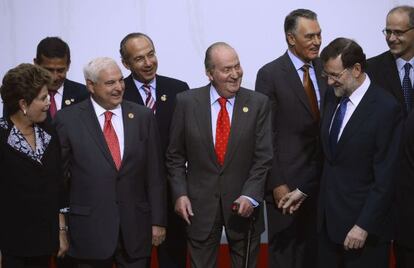Latin leaders pledge to help Spain and Portugal emerge from the crisis
Presidents warn Iberian nations that more austerity could lead to more misery

The 22nd annual Iberoamerican Summit ended Saturday night with a pledge by many Latin American leaders to help Spain and Portugal on the road to recovery. Latin leaders meeting in Cádiz for the two-day conference promised investment opportunities for Iberian-based companies, but also warned the two nations about the dangers of continuing to make drastic cuts in their own budgets, which, they argued, will only extend the social and economic crises further.
The leaders of Latin America, the Caribbean, Spain and Portugal signed a declaration pledging to promote and develop small and midsized businesses to increase production and competition as well as strengthen educational opportunities and promote jobs on both sides of the Atlantic.
But it was the euro crisis and the twin recessions in Spain and Portugal that were the main focus of this year’s summit.
“On this side of the Atlantic, we have undergone difficult situations caused by the economic and financial crisis. Now we are looking to you; we need more from Iberoamerica,” King Juan Carlos said at the opening of the summit, which was hosted by Spain.
Ecuadorian President Rafael Correa warned that more austerity would lead to more misery for both countries. “Don’t commit the same mistakes we did,” Correa said in reference to the 1980s and 1990s slump in Latin America.
Don’t commit the same mistakes we did” President Rafael Correa
Colombian President Juan Manuel Santos said that he was willing to put in his country’s “own grain of sand” to help Spain and Portugal emerge from their recessions, suggesting that his government would consider investing public pension funds in both countries.
Brazilian President Dilma Rousseff, who will meet with Spanish Prime Minister Mariano Rajoy on Monday as she continues her official visit to Spain, also offered to help Spanish companies. Brazil’s $2.3 trillion economy is fueled by a high consumer demand and building projects that could be a source of much-needed aid for Iberian companies.
“We have also been hit by the crisis because of the slowdown in international markets but we are widening public and private investment in infrastructure,” Rousseff told fellow leaders at the summit.
But Rajoy said Spanish companies needed an environment of legal certainty in Latin America, referring to Argentina and Venezuela.
Argentinian President Cristina Fernández de Kirchner, who didn’t travel to Cádiz after suffering a bout of hypertension, is engaged in an international dispute with the Spanish petroleum giant Repsol over her government’s nationalization of the oil firm’s YPF unit last April.
The leaders of Venezuela, Paraguay, Uruguay, Guatemala, Nicaragua and Cuba were also absent from this year’s summit.
This was the third time Spain has hosted the Iberoamerican Summit since it was first held in 1991. Following next year’s meeting in Panama, the summit will change its format and become a biannual event with Mexico scheduled to host the 24th edition in 2015.
“The Iberoamerican community is a firm reality,” said the king during the closing ceremony on Saturday night.
Other key agreements that came out of the summit include an agreement by all members to push for a special UN General Assembly no later than 2015 to discuss the international drug problem. The Inter-American Development Bank agreed to contribute some $420 million for medium size companies to help promote their exports abroad.
Tu suscripción se está usando en otro dispositivo
¿Quieres añadir otro usuario a tu suscripción?
Si continúas leyendo en este dispositivo, no se podrá leer en el otro.
FlechaTu suscripción se está usando en otro dispositivo y solo puedes acceder a EL PAÍS desde un dispositivo a la vez.
Si quieres compartir tu cuenta, cambia tu suscripción a la modalidad Premium, así podrás añadir otro usuario. Cada uno accederá con su propia cuenta de email, lo que os permitirá personalizar vuestra experiencia en EL PAÍS.
¿Tienes una suscripción de empresa? Accede aquí para contratar más cuentas.
En el caso de no saber quién está usando tu cuenta, te recomendamos cambiar tu contraseña aquí.
Si decides continuar compartiendo tu cuenta, este mensaje se mostrará en tu dispositivo y en el de la otra persona que está usando tu cuenta de forma indefinida, afectando a tu experiencia de lectura. Puedes consultar aquí los términos y condiciones de la suscripción digital.








































